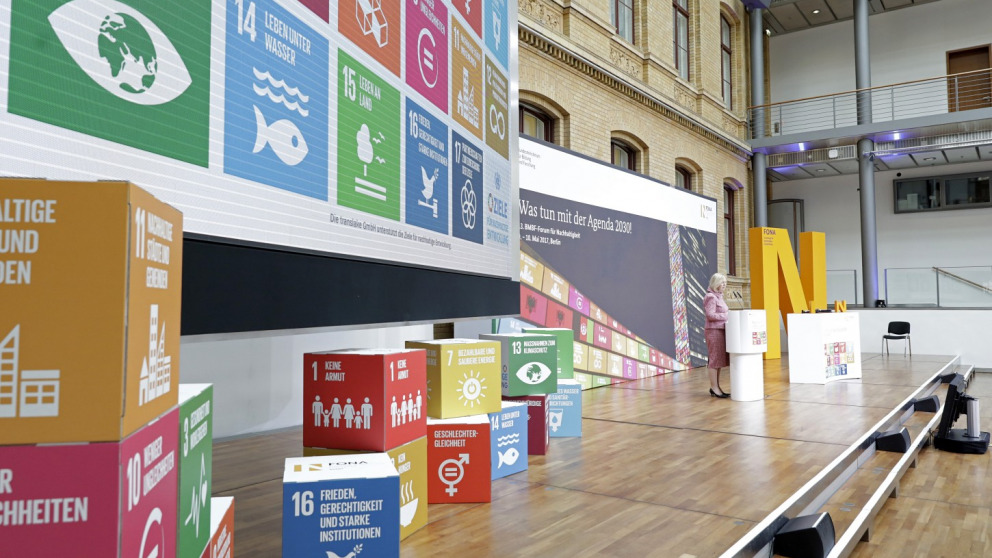Science Platform Sustainability 2030
Duration

Research is crucial to sustainable development: Germany's Sustainable Development Strategy of 2016 proposed the establishment of a science platform to support the implementation of the 2030 Agenda and its 17 Sustainable Development Goals (SDGs). The scientific community took up this proposal and launched the platform on 8 May 2017. The platform is supported by three organising institutions: the research networks Sustainable Development Solutions Network Germany (SDSN Germany), the German Committee Future Earth (DKN Future Earth), and the Research Institute for Sustainability (RIFS) in Potsdam.
Federal Minister Johanna Wanka and Head of the Federal Chancellery Peter Altmaier presented the new science platform to the public at the start of the 13th BMBF Forum for Sustainability (FONA) on 9 May 2017. During this event, platform representatives discussed issues in relation to the areas targeted by the SDGs and outlined their ideas for how the platform can become more firmly established in the German research landscape. At the annual conference of the German Council for Sustainable Development on 29 May 2017, Federal Chancellor Angela Merkel paid tribute to the Science Platform Sustainability 2030 for its role in Germany's sustainability strategy, stressing that it helped to give "science its rightful voice in the matter." This was evidenced at the 1st Sustainability Forum (Forum Nachhaltigkeit) in the Federal Chancellery on 13 June 2017, when representatives of the platform presented it to various federal ministries and stakeholders and entered into dialogue with them.
Supporting Germany's Sustainability Strategy
The platform seeks to support sustainability policymaking and to foster sustainable development in Germany by generating, collating, and strategically disseminating knowledge. It provides a scientific perspective on both the progress towards and obstacles to the implementation of the 2030 Agenda in Germany, with Germany, and through Germany. To this end, it gathers initiatives under one umbrella, collates research findings in relation to the Agenda 2030, and supplements these findings with concrete recommendations for political action.
In consultation with stakeholders from civil society, business and policymaking - for example in the context of the Sustainability Forum - it identifies areas where there is a need for research and communicates that to scientists. In addition to setting thematic priorities, the platform develops dialogue formats that enable it to facilitate a broad exchange of ideas among representatives from academia, policymaking, the private sector, and civil society. In this way, it contributes to the development of knowledge resources to support transformations towards a more sustainable society.
Bringing together actors and activities
As a key component of the German Sustainable Development Strategy, the science platform is part of the new architecture for sustainable development. A steering committee, co-chaired by RIFS Scientific Director Mark Lawrence, Dirk Messner (co-chair of SDSN Germany), and Martin Visbeck (chair of DKN Future Earth), supervises the platform's activities. The other members of the steering committee are drawn from academia, civil society, and business.
Members of the steering committee
The platform works closely with the Federal Ministry for the Environment, Nature Conservation, Building and Nuclear Safety (BMUB), the Federal Ministry of Education and Research (BMBF), the Federal Ministry for Economic Cooperation and Development (BMZ), the Federal Ministry of Food and Agriculture (BMEL), and the Federal Chancellery. All of these ministries welcome the establishment of the platform and support its work.
The platform actively engages with scientific associations, research networks, scientific advisory bodies, and civil society actors in order to take account of existing programmes and processes in its work and stimulate new initiatives. It joins forces with the research community in Germany and abroad to find knowledge-based solutions to sustainability challenges.
The steering committee is currently drawing up the work programme and clarifying structural and organisational issues in relation to the science platform. The platform's thematic priorities and the work and dialogue formats tailored to them are due to be presented in autumn 2017.
Secretariat at RIFS
A secretariat at RIFS coordinates the platform's scientific and administrative activities. Inquiries can be directed to the team at the secretariat.
In 2022, the Science Platform is undergoing a strategic development process, after completion of its first phase and based on an evaluation in 2021 that recommended continuation of the platform. During this time, a reduced managing office is being hosted by RIFS, with Prof. Mark Lawrence serving as co-chair of the platform, along with Prof. Christa Liedtke (representing the SDSN) and Prof. Daniela Jacob (representing the [DKN - German Committee Future Earth])(http://www.dkn-future-earth.org/).